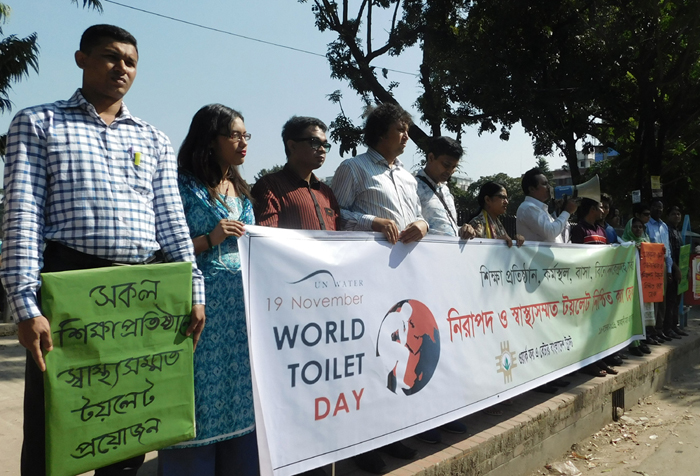
Safe and hygienic toilet management in work places is very essential for better human health. As there are not sufficient public toilets in roads, markets, recreational centers and in other public spaces and constructions, there is negative impact on health and environment. Moreover, it is important to emphasize on safe and hygienic toilet rather than only giving importance on constructing toilets. However, Dhaka North and South City Corporations have taken initiative to establish modern and germ-free toilets. In this regard clear strategies, guidelines, and plans need to apply for the best using of toilets for women, children, and disabled people. 19 November 2016 at 11 a.m., a human chain was organized by Work for a Better Bangladesh (WBB) Trust, in front of Abahany Field, Saat Mashjid Road, Dhanmodi to celebrate World Toilet Day 2016, named “Ensure safe and hygienic toilet in educational institutions, work places, home, and recreational centers” and speakers expressed above view there.
The speakers mentioned that the Toilet Day is celebrated every year on 19th November. The vision of Toilet Day is to ensure secure and clean toilet for all. About 250 million people in the world are deprived from using toilet. For having insufficient sewerage management, there is negative impact on livelihood. At present, people do not use public toilets since those are unsecured and dirty. As the both corporations have taken initiative to establish toilets already, it is necessary to implement that. Again, it is needed to ensure proper public toilet management for floated people on road or in the city. In this case, toilets in governmental institutions need to be in better quality. Later, it is important to aware people on using public toilets.
Moreover, the speakers said that public toilets need to be accessible for women, children, and disabled people. Besides, the toilets need to keep clean with having better qualities and it is important to inspire people to use those. Thus, it is important to keep hand wash, sufficient water, towel, and toilet paper in each public toilet. For not having sufficient, safe and secured toilets, women, children, and disabled people face various challenges. At present women workers keep them away from using latrines for several times. Thus, they suffer a lot from various types of diseases.
The human chain was presided by Gaous Pearee, Director, WBB Trust and moderated by Atiqur Rahman, Project Officer, WBB Trust. Maruf Hossain, Program Manager, Syeda Anonna Rahman, Program Manager; Ziaur Rahman Litu, Senior project officer; Talukder Rifat Pasha, Assistant Project Officer of WBB Trust; D M Saklayen, Executive Director, Janashartho Foundation; Shawjol Kumar Moitro, Program Officer, Aid Foundation and Shahidul Islam, Program Manager, Space were the speakers of the program. Besides, Naznin Kabir, Deputy Program Manager; Sharmin Akter Rini, Project Officer, Fahmida Islam, Project Officer, Naima Akter, Assistant Advocacy Officer of WBB Trust and Mandy Indrani Mukhuti, Youth coordinator, Institute of Wellbeing were present in the program.

